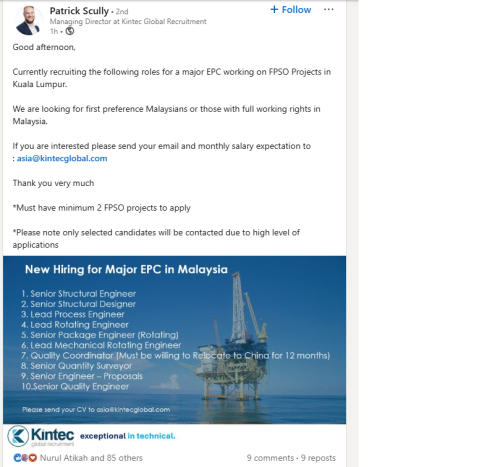KUALA LUMPUR: A protracted rift between Malaysia’s national oil corporation Petronas and the Sarawak state government appears to be causing investor disquiet following a surprise withdrawal by United States oil firm ConocoPhillips from an oil project off the Borneo coast.
In a little-publicised surprise move this month, ConocoPhillips decided to withdraw from operating the Salam-Patawali deepwater oil and gas field that the company discovered in 2018 with Petronas in a 50-50 joint-venture that was expected to cost RM13.7 billion (US$3.13 billion).
The withdrawal was first reported by Upstream Online, a widely tracked industry news resource, on Apr 15 but has otherwise gone unreported in Malaysia media.
Two industry sources close to ConocoPhillips separately confirmed the pullout with CNA. They added that the move was part of a “country strategy review” which the company did not elaborate on.
Efforts by CNA to reach company executives in its Kuala Lumpur office were unsuccessful as telephone calls went unanswered.
Industry executives told CNA that ConocoPhillips’ move was in part driven by the uncertain regulatory environment arising from the spat between Petronas and the state government headed by Premier Abang Johari Openg.
The Sarawak government, which owns oil and gas firm Petroleum Sarawak or Petros, is demanding greater control over its resources.
The industry executives with close ties with ConocoPhillips said that the company would now be focusing on its activities in neighbouring Sabah, where it already has operations.
“The sentiment is that foreign companies are uncomfortable because they see that Petronas is under pressure in Sarawak and the oil company (Petronas) is often the joint-venture partner in many exploration projects,” said a senior executive of a Western oil contracting firm based in the capital Kuala Lumpur.
According to ConocoPhillips’ factsheet on its Asia Pacific operations dated April 2024, it has exploration, development and production activities across about 2.7 million net acres in Malaysia.
Net acres refer to the amount of leased real estate that a company holds, pertaining to its working interest.
It has working interests in six production sharing contracts in Malaysia, and Petronas is listed as a “co-venturer” in all six contracts.
The Salam-Patawali exploration block encompasses 300,000 net acres primarily in the Salam and Benum fields off southern Sarawak.
“The company continues to evaluate the block and information from prior well results. A 3D seismic survey was acquired in 2023, and processing and evaluation of this data is currently ongoing,” it stated.
Typically, under production sharing contracts signed with Petronas, private oil companies surrender rights to oil fields back to the Malaysian oil corporation should they decide to discontinue exploration and production plans.
CORPORATE ESPIONAGE?
Industry executives noted that the latest move by ConocoPhillips comes on the heels of another review by a foreign firm.
Upstream Online reported in February that Thailand’s PTTEP – the exploration arm of its national petrochemical firm PTT – is re-engineering the Lang Lebah gas project off Sarawak shore “to improve the economic viability of the project”.
PTTEP has a 42.5 per cent share in the Lang Lebah project, according to a factsheet on its website dated Dec 31, 2024.
The development cost of the project has been reported to be about US$6 billion.
Sources told CNA that PTTEP temporarily suspended the development of the project and has postponed the final decision until sometime next year.
The spat between Sarawak and Petronas isn’t only hurting foreign investor sentiment in Malaysia’s robust oil and gas sector. It has also attracted allegations of corporate espionage.
Former Petronas manager Khairul Akmal Jasni pleaded not guilty in a Sessions Court in Kuala Lumpur on Apr 18 to charges that he had attempted to leak highly confidential information in June last year on the national oil corporation’s inner workings to Petros.
Cases of corporate spying are extremely rare in Malaysia and the allegations that Khairul had sought to share a document titled “Q1 2024 Upstream Business Performance, Operational & Financial” underscore the rising stakes in Sarawak's quest to break the national oil corporation’s monopoly.
The latest twists are also putting pressure on Prime Minister Anwar Ibrahim to press both Sarawak and Petronas to reach a solution at a time when the country is grappling with growing headwinds to the economy due to uncertainties from the US’ campaign on global tariffs.
A senior aide to Anwar, who spoke on condition of anonymity, said that the premier had been briefed by top Petronas officials on the status of the dispute with Sarawak.
“No change. Both parties are in a holding pattern with both holding firm to their positions,” said the aide.
A senior Petronas official, who spoke on condition of anonymity, also confirmed that talks with the Sarawak government have not progressed.
Sarawak is challenging the decades-old monopoly Petronas has held since it was incorporated under a parliamentary statute in 1974 known as the Petroleum Development Act or PDA. The PDA, among other things, decrees that the national oil corporation is the sole guardian of the nation’s hydrocarbon reserves.
Sarawak, whose probable and proven reserves of petroleum represent 60.87 per cent of Malaysia's total and which accounts for 90 per cent Malaysia’s liquified natural gas (LNG) exports, is insisting that PDA does not apply to the state.
https://www.channelnewsasia.com/asia/malays...ntiment-5089371 

 Jan 1 2025, 08:56 AM, updated 9 months ago
Jan 1 2025, 08:56 AM, updated 9 months ago
 Quote
Quote


 0.0585sec
0.0585sec
 0.28
0.28
 5 queries
5 queries
 GZIP Disabled
GZIP Disabled